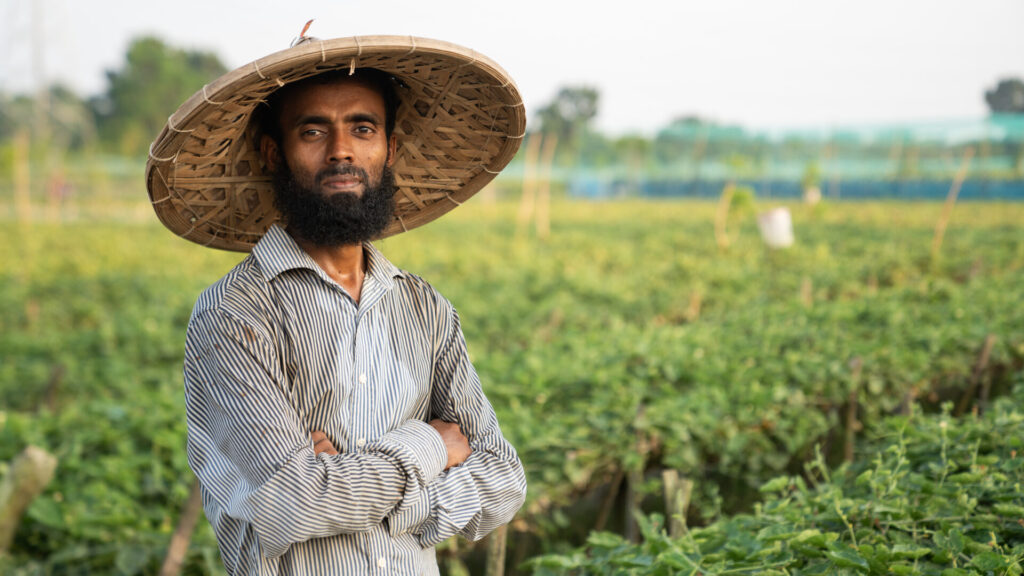
Resilient Food Systems are Everyone’s Business: The Private Sector’s Role in Climate-Smart Agriculture
November 6, 2024 | 4 Minute ReadAdapting to a changing climate requires all-hands-on-deck. Engaging the private sector in climate-smart agriculture is just one of the ways Chemonics’ programs are supporting inclusive and sustainable practices that promote economic growth.
Productive, resilient, and inclusive food systems have the power to accelerate communities towards growth and prosperity. But in many countries, climate change-related shocks and stresses pose a serious threat. Bangladesh is one of these countries. The World Bank predicts that by 2050, one third of Bangladesh’s agricultural GDP may be lost to extreme events caused by climate variability, and 13.3 million people could be displaced by climate impacts on agriculture, water scarcity, and rising sea levels. Engaging the private sector to promote climate-smart agriculture (CSA) is a critical way to mobilize resources for sustainable growth and productivity by reducing greenhouse gas emissions while also strengthening farmers’ resilience to climate-related shocks and stresses.
Accelerating the Adoption of Climate-Smart Innovations
Biopesticides are a promising alternative to synthetic pesticides in climate-smart pest management, particularly for smallholder farmers. The USAID Feed the Future Bangladesh Horticulture, Fruits, and Non-food Crops Activity conducted a study during a period of rapid growth in biopesticide and bio-fertilizer sales. By partnering farmers with private sector agribusinesses and offering essential information and incentives to adopt biopesticides, farmers reported 13% improved overall yields, largely due to reduced soil degradation. This intervention would benefit over 80,000 farmers in Bangladesh.
Importantly, the study found that simply connecting biopesticide dealers to farmers was not enough. It was crucial to engage aggregators and other market actors on the value and feasibility of transitioning to biopesticides. CSA emphasizes sustainable resource management, reducing dependency on chemical inputs, and enhancing biodiversity – all of which are supported by the successful adoption of biopesticides. As farmers shift towards climate-smart practices, they build greater resilience against pests and diseases, improve soil health, and promote ecological balance. This holistic approach, bolstered by strong private sector partnerships, ultimately supports long-term food security and environmental health.

MD Oliyar Rahman grew pointed gourds using safe production methods, which will allow him to fetch a higher price.
Supporting Access to Information and Digital Technologies
At this year’s Cracking the Nut conference in Abuja, Nigeria, a recurring theme was farmers’ significant lack of access to information and digital technologies, which impacts their ability to engage in sustainable agriculture. With digital technologies at the core of almost every business, the absence of these resources hinders the adoption of effective CSA solutions, including precision agriculture pest and disease management and weather forecasting. Digital tools developed by the private sector can support farmers to increase production and strengthen evidence-based decision-making. For instance, GPS and remote sensing tools allow farmers to monitor crop health and soil conditions in real-time. This informs more precise decisions about resource use, including ways to optimize irrigation and fertilizer application, to improve yields while minimizing environmental impact. Additionally, digital tools enhance CSA through training and knowledge sharing, with online platforms and mobile training modules providing the latest information on sustainable practices that improve soil health and water conservation.
Bioflore, one of the 28 startups supported by the Cargill-funded Land Innovation Fund for Sustainable Livelihoods, is an example of how digital technologies can enhance CSA solutions. Bioflore adapted an algorithm originally designed for facial recognition to identify forest flora species, which are then cataloged through drone flight surveys. This data feeds into a comprehensive platform that quickly and accurately generates a detailed portrait of biodiversity in conserved areas of rural properties. This technology enhances biodiversity management, allowing farmers to better understand the variety of species on their land through effective cataloguing. Additionally, protecting native flora promotes sustainable practices, helping to maintain soil health and improve water retention, which ultimately leads to better yields. By enhancing ecosystem services, farmers can increase productivity while reducing reliance on chemical inputs. This combination of scientific knowledge with cutting-edge technology makes the mapping and detection of species present in rural properties across the country economically viable.
Private sector engagement can drive sustainable agricultural practices in a variety of contexts. In Uganda, Byeffe Foods, a female youth-led health food processing company, partnered with the Feed the Future Uganda Youth Leadership for Agriculture Activity in training farmers to use a locally adapted variety of pumpkin that can be grown year-round using organic practices that support soil health. This ensured that 1,280 smallholder farmers – primarily youth and women from Eastern Uganda – were able to increase their incomes through new markets and strengthen their resiliency to climate shocks, while also reducing their carbon footprint. Businesses play a critical role in integrating innovative technology and ecological stewardship in farming, ultimately enhancing both productivity and environmental resilience.
Collaborating with the Private Sector to Scale Impact
With global food needs projected to increase by 70 percent by 2050, ensuring the future of agriculture and resilient food systems is everyone’s business. Partnership strategies for accelerated change and access to new technologies can be modified and scaled for greater impact in other settings, too. For instance, the “Achieving Zero Hunger through Market-Based Solutions” episode of the Countdown to the SDGs podcast highlights how the USAID Agriculture Growing Rural Opportunities (AGRO) Program has leveraged market solutions to increase global food security.
Together, global development actors, the public and private sectors, and communities must collaborate on developing and implementing innovative solutions to meet global agricultural, climate, and environmental demands.
Banner image caption: Ms. Rabeya Sultana transfers seed trays from floor level to a higher platform to avoid excessive water and soil-borne insects.
Posts on the blog represent the views of the authors and do not necessarily represent the views of Chemonics.

